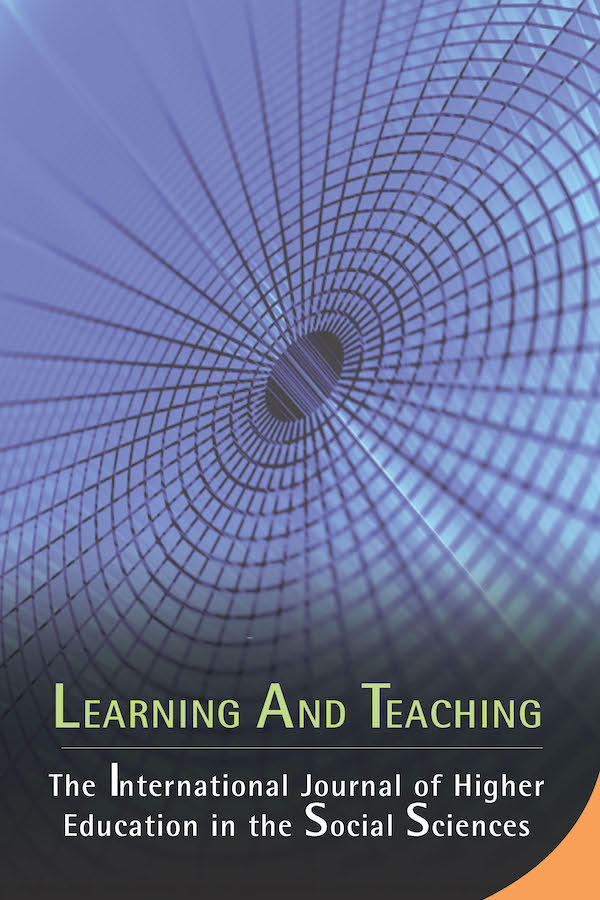
Learning and Teaching (LATISS)
The International Journal of Higher Education in the Social Sciences
ISSN: 1755-2273 (print) • ISSN: 1755-2281 (online) • 3 issues per year
Editors:
Penny Welch, Faculty of Arts, Business and Social Sciences, University of Wolverhampton
Susan Wright, Danish School of Education, University of Aarhus
Subjects: Education, Social Sciences
 Available on JSTOR
Available on JSTOR
Latest Issue
Volume 18 Issue 2
Introduction: Alternative internationalisms
Thinking through and beyond criticality in international higher education
This special issue is the result of three years of conversations and scholarly exchange, emerging from the Alternative Internationalisms working group of the ‘European Universities – Critical Futures’ project. This project, led by Professor Susan Wright and funded by the Independent Research Fund Denmark, allowed for the development of a network of seventeen European research centres, including both senior and early stage researchers, with the stated objective ‘to rethink the role of European universities in a context of political, social and geopolitical upheaval’ (European Universities – Critical Futures n.d.). The internationalisation of higher education is a necessary area for exploration in any rethinking of what European universities can and should be, and so this was one of the foci of the project through a working group of researchers and academics in different parts of the world. ‘Rethinking’ as the overarching aim of the ‘European Universities – Critical Futures’ project allowed not just for an open and curious approach to internationalisation, however, but for stepping back to consider just what ‘the international’ means for those involved in higher education.
Thinking otherwise about internationalisation
Mad Libbing a biased field
Theorisation of higher education internationalisation is biased both as a Western activity and as Euro-/Anglocentric and Anglophone research. In this article, we first argue that it is necessary to ‘think otherwise’ about internationalisation. We then present theorisations of how this could be achieved. As our analysis, we conduct a Mad Libs exercise of two internationalisation documents in which we replace the word ‘international’ and its derivatives with words stemming from the ideological trajectory of the post-Second World War history of internationalisation: ‘peace-seeking’, ‘neoliberal’ and ‘equitable’. The Mad Libs exercise is a playful subversion that helps us break away from the rigidity and structuredness that keep us reproducing biased theorisations.
The debate on centres and peripheries in higher education
Returning concepts to the critical cycle
The concept of ‘centre and periphery’ has become ubiquitous in the study of higher education, especially in an international context. Through an engagement with the recent scholarly literature, we argue that simultaneously this concept has been decontextualised and naturalised. Its origins were largely forgotten and centre and periphery started to be descriptive of ‘the way the world is’. This article argues for the
Is another internationalisation possible?
Reconsidering public university engagement from a Latin American perspective
This article discusses ‘another’ internationalisation of higher education through the lens of the ‘third mission’ of engagement from a Global South viewpoint. It recontextualises internationalisation and the third mission through the meanings and practices of university extension in Latin America. Within a Global North perspective, internationalisation of the third mission is under-studied, compared to the internationalisation of teaching and research. We offer a case study of the Montevideo Group University Association (Spanish acronym: AUGM), an association of Latin American public universities promoting academic exchange in teaching, research and extension. We further our analysis and discussion through a within-case analysis of Uruguay's Udelar, the eponymous founding location of AUGM. At a moment of radical, debilitating global and national marketisation and privatisation focused on the individual, the case of AUGM's internationalisation of regional public extension is complemented by Udelar's case-within-a-case of extension, tying widened higher education access to national democratic reforms.
Book Reviews
Krystian Szadkowski (2023),
Virna Rossi (2023),
Rosi Smith (2024),
Gary Saunders (2023),
Arun Verma (ed.) (2022),